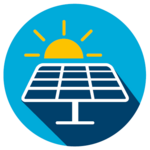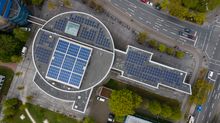Energy
Energy

The areas of energy and energy management are among the most important fields of action for achieving sustainable development and climate protection. With the intention of continuously and sustainably reducing energy consumption, the University of Oldenburg implements various energy-saving projects and energy-related renovations every year.
These measures are partly financed through intracting, which is used for new investment projects through energy improvements. The measures that are being implemented as a priority to reduce energy consumption include the renovation of outdated ventilation and heating systems, the steady expansion of lighting installations in LED and the energy modernisation of the building infrastructure. In addition, the university is also currently examining whether it would make sense to install a battery and / or hydrogen storage system to optimise photovoltaic energy.
Greenhouse gas emission
The area of building energy causes the largest share of the university's total emissions. In 2022, a total of 16,898 t CO2-equivalents were produced here, compared to 12,318 t CO2-equivalents in 2020. This area thus accounted for 73,83% of total emissions in 2022. The commissioning of the new cogeneration plant and the corresponding increase in emissions in this area of activity has also increased the importance of this area in the overall balance sheet.
Photovoltaic systems
For years, the University of Oldenburg has been a pioneer in the expansion of PV systems in Lower Saxony and throughout Germany. Most recently, further systems were commissioned at the Haarentor site in March 2022. The electricity is used exclusively for the university's own needs. In total, the systems can save almost 360 tonnes ofCO2 per year.
Expansion of energy management system
In order to further reduce the energy consumption andCO2 emissions of the University of Oldenburg and the Jade University of Applied Sciences, the project to implement the expansion of the existing energy management system was launched on 2 January 2024 with funding from the Federal Ministry of Economics and Climate Protection.
Example project
Freie Kühlung Rechenzentrum
With the increasing digitalisation of research, teaching and administration at the University of Oldenburg, the demand for computing power and storage capacities is also growing, and with it the energy consumption of the IT infrastructure. With a share of about 30 % of the total consumption, the computer centre is currently the largest electricity user within the university. In particular, the necessary air conditioning of the server rooms is very energy- and cost-intensive. The new computing cluster therefore has efficient cooling with outside air. New high-performance computers are equipped with direct water-cooled server processors, which allow higher supply and return temperatures of the cooling water. Even at values of up to 35°C, the outside temperature is sufficient to achieve optimal cooling of the data centre. Therefore, no compression chiller is needed to reduce the cooling water temperature. Annually, about 500,000 kWh of energy and about 110,000 EUR in energy costs can be saved.
Measures from climate action concept
The following list of measures in the field of action Energy & Construction can be taken from the Integrated Climate Action Concept of the university. A more detailed view of the respective sub-measures can also be viewed there.
Area of heat
- Energy efficiency in heat generation
- Waste heat utilisation for cooling
- Change of energy source for heat to electricity
- Use of renewable energy for heat
- Refurbishment of the building envelope
- Greening of buildings
- Shortening the operating times of technical systems
Electricity
- Energy efficiency in ventilation systems
- Energy efficiency in lighting
- Optimisation of cooling systems
- Use of renewable energy for electricity
- Testing energy recovery from WindLab
General
- Energy cost budgeting
- Communication
- Examination of the development of local heating networks at the municipal level
- More efficient space management
- Relocation of the faculties' small computer centres to the central computer centre
- Strengthen sustainability in building projects





